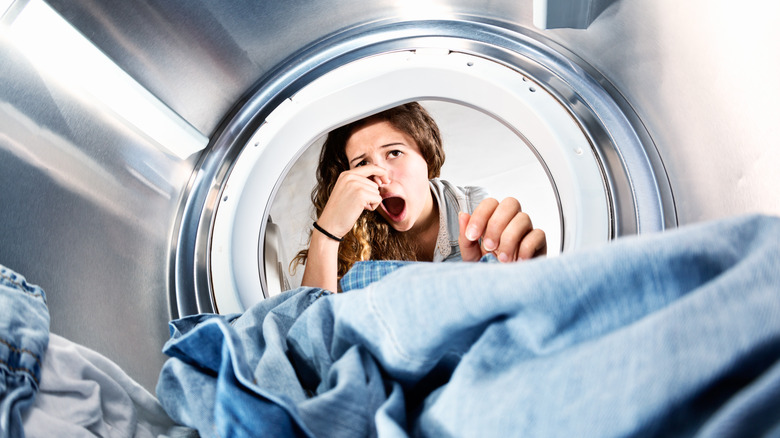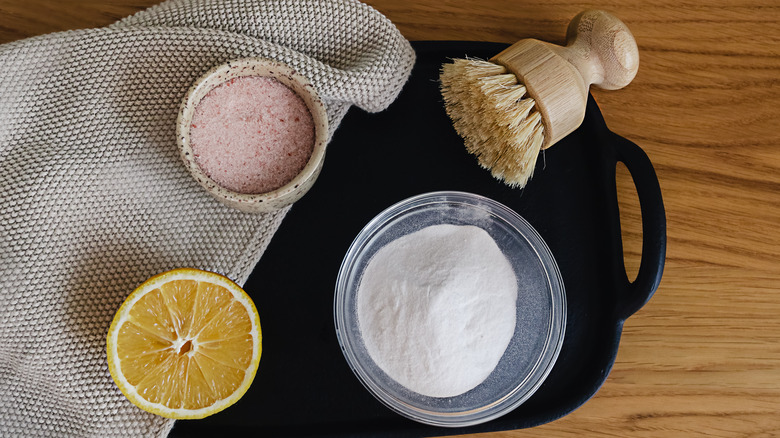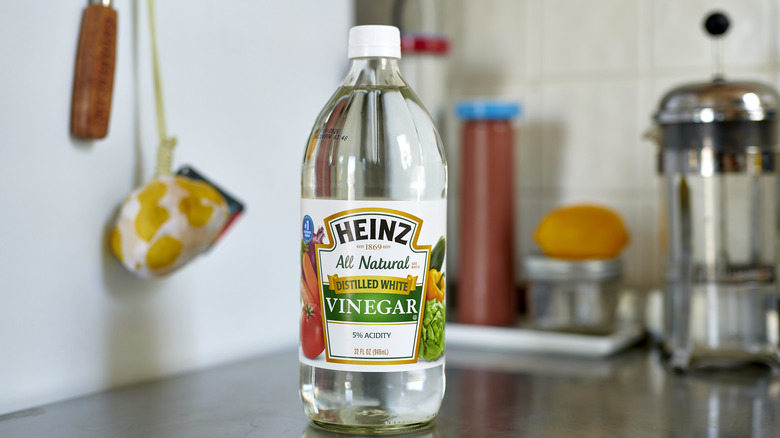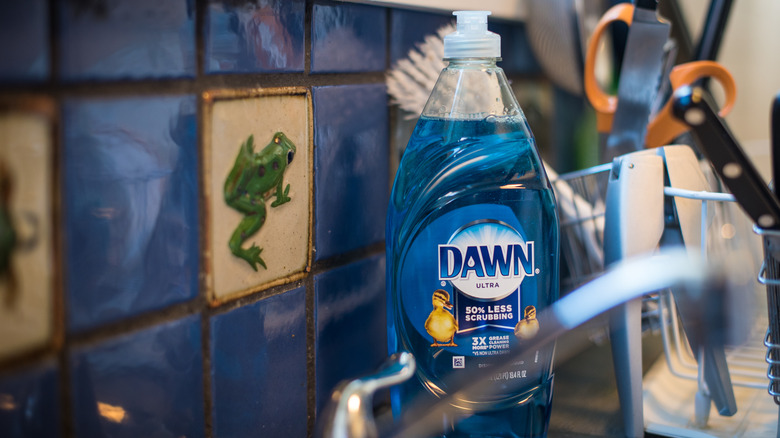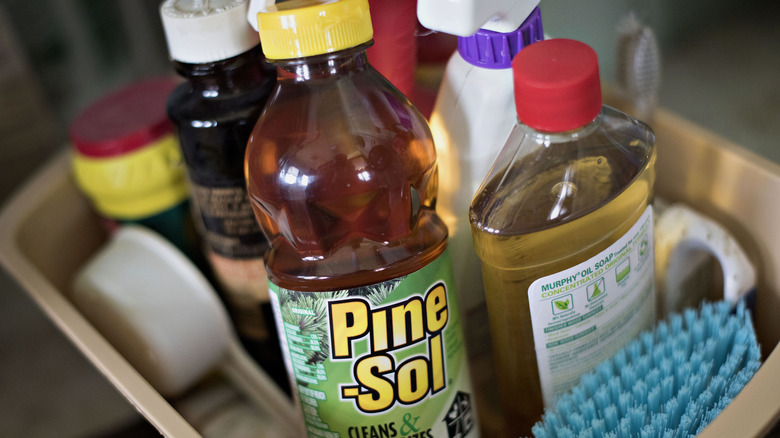5 Ways To Get Those Stinky Grease Smells Out Of Your Clothes
Washing grease-stained clothes is a familiar challenge, but the lingering odor can turn this everyday annoyance into a persistent problem. When you're up against grease, you're battling more than a spot of discoloration, as it doesn't just sit atop your clothes. Instead, it embeds itself within the fibers, creating a bond and an odor that's tough to break without the right approach. This is because grease is a lipid and repels water. In the laundry room, it's a formidable adversary, one that a simple spin in the washer often can't defeat. Instead, common household items like borax, vinegar, baking soda, dish soap with eucalyptus oil, and Pine-Sol can become valuable players in your odor-fighting lineup. Each recommended approach harnesses unique chemical properties designed to dissolve or absorb both the grease and its accompanying odor, ensuring that you're not just cleaning the surface but truly refreshing the garment.
Conquering grease stains requires a blend of effective ingredients and the right technique. The amount of product utilized, the duration of the soak, the temperature of the water, and the gentle agitation techniques used are vital to these cleaning processes. Knowing how to remove these stubborn stains and their odors effectively will not only save you time but also protect the longevity of your clothes.
Borax and water
Also known as sodium borate, borax is a mineral compound that's a staple in many homeowners' cleaning arsenals. It's a naturally-occurring substance that's mined from lakes and primarily composed of sodium, oxygen, and boron. This mineral marvel is renowned for its natural deodorizing abilities along with its gentle yet effective cleaning properties. Mixing borax into water transforms it into a cleaning agent, as some of the water molecules become hydrogen peroxide, a product that kills bacteria. Using borax with warm water will further enhance its grease-dissolving abilities.
When using this material to remove odors caused by grease stains, start by filling a sink or basin with a gallon of warm water. Sprinkle a quarter cup of borax into the container, stirring until completely dissolved. Next, immerse your grease-stained clothes, making sure the affected areas are thoroughly soaked. Give the fabric a gentle swish to distribute the solution evenly. Now, patience plays its part, as the garment needs to soak for a full 30 minutes. You can then wash the item in a regular wash cycle. Another odor-fighting technique is to add half a cup of borax into the washer with your stinky clothes. It's worth noting that, while borax is compatible with most fabrics, it's still smart to do a quick test on a small, inconspicuous area of your garment before proceeding. Steer clear of using it on clothes that are marked as dry clean only or those with delicate fabric care instructions.
White vinegar
When grease odors cling to your clothing, a strong laundry detergent coupled with white vinegar can be your go-to solution. Detergents contain surfactants and enzymes that target grease and protein-based stains, breaking them down into smaller molecules that can be easily washed away. On the other hand, white vinegar cuts through grease with its acetic acid content. It works to disintegrate oil, ensuring it leaves the fabric. When mixed with detergent in your wash, white vinegar helps to lift stains and eliminate odors.
To use white vinegar to remove grease odors, begin by adding the recommended laundry detergent amount to your smelly load and begin a regular wash cycle. Then, during the final rinse cycle, introduce half a cup of white vinegar. This final step is crucial; it rinses away lingering odors and any residual grease. However, note that too much vinegar can damage certain fabrics and alter the colors of dyes due to its acidic nature, so only use half a cup.
Baking soda
When you're up against the pungent scents of oils and fats, baking soda — or sodium bicarbonate — becomes more than a pantry staple; it's a necessity in the laundry room. It goes beyond the surface, actively neutralizing the very molecules responsible for that distinctive grease odor. It fights against the grease that tarnishes the freshness of your clothes.
Here's how to use this household staple in your laundry routine: First, douse the greasy areas with a sprinkle of baking soda, then let it sit for about 10 minutes. Remove the baking soda by scraping it off and wash the garment in a hot water cycle. Repeat these steps until the stain is removed. This ingredient is best used when the stain is still wet or has recently occured, as the baking soda will draw the moisture out of the garment. If this doesn't prove effective, you can also add a small amount of dish soap to the baking soda to create a paste, then scrub it into the stain. After allowing it to sit for 10 minutes, add the clothing item to the wash.
Dish soap and eucalyptus oil
Dish soap is celebrated for its grease-cutting power because of its surfactants. These compounds are experts at surrounding oil and grease, making them soluble in water so they can be rinsed away. Eucalyptus essential oil, on the other hand, has antiseptic qualities, a refreshing scent, and is known for its ability to neutralize odors. Therefore, using these two ingredients together could cut through the smelly grease stains on your clothes.
To tackle the stubborn smells, mix a quarter cup of dish soap with 1 tablespoon of eucalyptus oil to create a rich lather and gently scrub the stain with a toothbrush. Let the mixture sit for about three hours, giving the dish soap time to break down the grease. Meanwhile, the eucalyptus oil's scent will permeate the fabric, providing a clean and crisp fragrance. After the soak, transfer the garments to the washing machine and launder them as usual, using the hottest water safe for the fabric. It's important to note that while dish soap and eucalyptus oil are effective, they should be used in moderation to prevent any residue from lingering on your clothing. Also, it's wise to perform a spot test with the eucalyptus oil to ensure it doesn't affect the color of the fabric.
Pine-Sol or Lestoil
While navigating the world of odor removal, you might be surprised to find Pine-Sol and Lestoil stepping out of their usual cleaning realms and into your laundry routine. Pine-Sol has many uses around the house, while Lestoil is heavy-duty and less popular but just as effective. Either of these products should have a place amidst your laundry supplies, especially when combating grease odors. Pine oil, the key ingredient in Lestoil, is a natural disinfectant that cuts through odor-causing bacteria with its antimicrobial properties. While Pine-Sol may not contain real pine oil, it is still an effective disinfectant that can remove greasy odors.
When employing these stalwarts of stain removal, pour a small amount on grease patches, scrub with a toothbrush, and leave for 20 minutes. Then, wash in the laundry machine with hot water. You can also add half a cup of Pine-Sol or Lestoil to your wash if needed. However, keep in mind that you should never use these products on delicates or woolens. They are potent and best reserved for durable fabrics that can handle their strength. They should also only be used on whites or colored fabrics that won't fade, and you may want to test them on a small area of your garment before pouring a large amount into the wash. Moreover, do not use them with bleach — when mixed, they can produce dangerous fumes.
